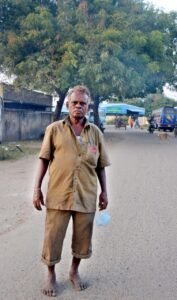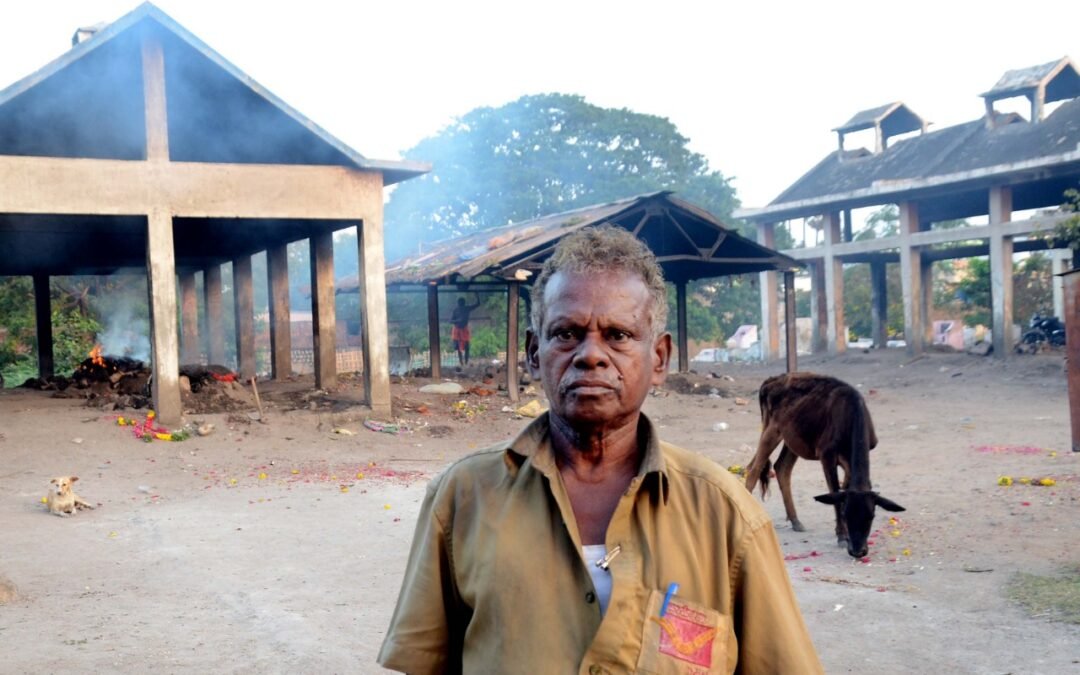Read in : தமிழ்
“I was around 12 or 13 when I started living in this crematorium,” says Hari, the undertaker at Thathaneri crematorium in Madurai. Hari is not just the man who receives the dead and facilitates the last rites in the neighbourhood. He is also the Good Samaritan, known for his generous heart and willingness to help folks.
Hari doesn’t remember much about his childhood except that he started doing odd jobs in the crematorium around 1975. “It was a suburb of Madurai those days and thick of bushes and shrubs. After the odd jobs, I would play around this neem tree that was just a sapling then,” Hari shows a huge tree. The sapling was like a playmate to the boy and he started growing more saplings during his free time. At 59 now, he has planted 2,668 trees in various places of Madurai and won an award of ‘Pasumai Nayagan’ in 2018.

Hari with the first neem trees he raised as a boy
Hari’s charity doesn’t stop with planting saplings. For the poor people, especially washermen and their women, living near crematorium this undertaker is a savior, the last resort to run for help. “Recently, three girl children stopped their education because they couldn’t pay school fees. We decided to ask Hari anna and he immediately obliged. The children are going to school again,” says Panjavarnam, a resident near Thathaneri crematorium.
Hari has helped many people including elderly and widows. But his generosity comes with certain conditions. “They should be genuinely poor people and have no other option. He won’t assist if he realizes that they have money, not even his own relatives in that case,” adds Tamilselvi, another woman.
Hari doesn’t recall how many people he has helped. He spends most of his salary and tends to borrow for charity, which ranges from money for school fees to beds for the nearby maternity hospital, as well as wheelchairs to the differently abled. “I happened to cremate a fully pregnant woman who died at childbirth. Even as a seasoned undertaker, I was shaken a bit. So, I bought a couple of beds for a government maternity hospital nearby to get out of that trauma,” he says.
Hari’s charity doesn’t stop with planting saplings. For the poor people, especially washermen and their women, living near crematorium this undertaker is a savior, the last resort to run for help.
As he grew up, he married but didn’t have children. So, the couple adopted a girl child from the locality. The girl is married to an engineering graduate and Hari has two grandchildren. “Covid19 has ruined their livelihood. I am kind of borrowing to cater to their needs. But I am not able to say no when deserving people approach me for help,” he said.
For 40 plus years as undertaker, Hari has seen more deaths than life, giving him insights into life and society. “Healthcare and sanitation have improved a great deal,” he says, drawing parallels to how many dead bodies used to arrive at the crematorium. “People used to die like sparrows those days. There were not many hospitals or healthcare. But I have also cremated really old people, say above 100 those days. For all the improved healthcare facilities, people don’t live that long nowadays,” he adds
For 40 plus years as undertaker, Hari has seen more deaths than life, giving him insights into life and society.
Though he never entered a school and remained illiterate all his life; the insights he drew from his experience and knowledge he gained by hearing from people have turned Hari a wise man. He casually quotes Mohammed Gazhni’s relentless attacks on India comparing it to his repeated attempts to raise trees in crematorium premises. “People don’t allow the saplings to grow. I am planning to plant 400 more saplings before I retire. I got another six or seven months or so in this government service. But I will hang around in this crematorium after retirement and help out people who come looking for me,” he said.
Read in : தமிழ்











